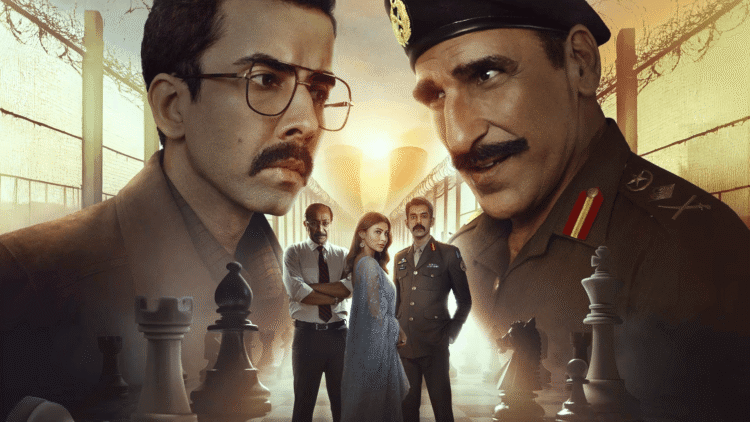Salakaar, the newest spy‑thriller directed by Faruk Kabir, lands on our screens promising pulse‑pounding tension, time‑bending plots, and AI‑driven espionage. The five‑episode series, streaming now on JioHotstar, rooted in real‑world events, chronicles Ajit Doval’s exploits while attempting to fuse past and present, instinct and intellect, feeling and action.
Story
The story opens with Pakistani Colonel Ashfaq Ullah (Surya Sharma), who has built a nuclear weapons facility in Kahuta—dubbed Project Kahuta—with the intention of striking India. He becomes infatuated with his son’s teacher, Mariam (Mouni Roy), who is secretly a RAW operative. Using her proximity to Ashfaq, she extracts critical details about the plant and relays them to the RAW chief, who in turn informs NSA (Purnendu Bhattacharya). The NSA then recalls his former identity as Adhir Dayal (Naveen Kasturia), who was posted in Pakistan in 1978 and thwarted General Zia Ullah’s (Mukesh Rishi) plan to unleash nuclear devastation on India. The narrative then oscillates between this flashback and the present day, gradually revealing all the answers by the series’ conclusion.
Performances
Casting two actors for the same lead is a gamble, yet Naveen Kasturia and Purnendu Bhattacharya—who portray the younger and older Adhir Dayal—manage it with confidence. Kasturia supplies razor‑sharp cunning, while Bhattacharya contributes gravitas and sagacity, together forming a convincing continuity.
Mouni Roy, playing Shristi Chaturvedi (alias Mariam), wears a perpetual “smoldering concern” like a second skin. Though packed with secrets, her screen time is limited, reducing her to a decorative femme fatale. Surya Sharma’s portrayal of the intense Colonel Ashfaq Ullah adds magnetic charm, but his romantic detour with Mariam feels like an indulgent subplot. Mukesh Rishi remains compelling, embodying General Zia‑Ullah with effortless authority.
Rohit Tiwari, cast as the R&AW secretary, is hampered by a thinly written role, whereas Janhavi Hardas injects a flash of realism as a brief yet memorable embassy staffer.
Behind the scenes
Visually, Salakaar is polished and assured. The production design clearly demarcates the two eras and locations, giving the story texture and atmosphere—more than mere period dressing, it reflects deliberate visual intent.
The soundtrack blends in seamlessly; the song “Oh Baleya, Oh Baleya” rises from background accompaniment to a stirring patriotic anthem.
Admittedly, the romance feels obligatory and the dialogue occasionally overly tidy, but strong core performances and stylish execution smooth over the inevitable lulls.
Final Verdict
Faruk Kabir arrived with a solid concept: merge a real spy’s legacy with a fictional modern crisis, sprinkle in AI, and probe loyalty across generations. Yet somewhere between ambition and execution, Salakaar loses its razor’s edge.
The writing skims rather than delves into themes of patriotism, personal sacrifice, generational trauma, and moral ambiguity. There is no gut‑wrenching twist, no razor‑sharp repartee, no gray zones that elevate spy dramas. Everything is merely “okay,” and in this genre, that falls short.
Salakaar possesses all the right ingredients—a strong cast, an intriguing hook, and a politically charged premise—but the final recipe is bland. It fails to spark fear, urgency, or empathy, leaving viewers able to watch, forget, and move on.























